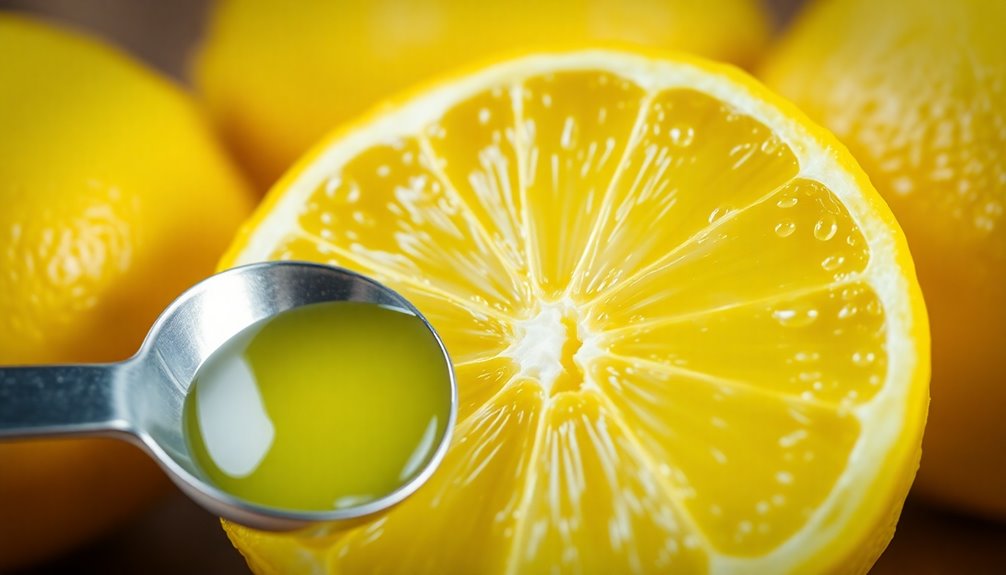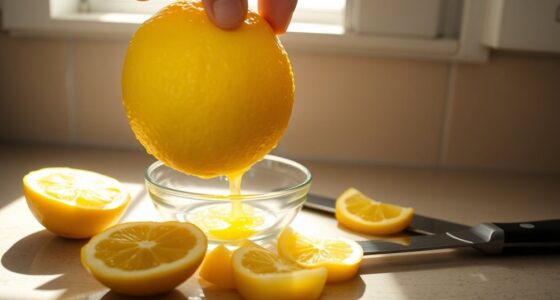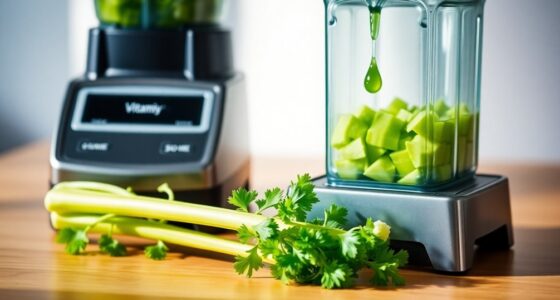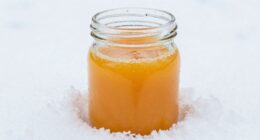A medium lemon typically yields about 2 to 3 tablespoons of juice, while larger lemons can give you up to a quarter cup or 4 tablespoons. Smaller lemons may produce as little as 1½ tablespoons. Since juice extraction can vary depending on size and ripeness, it's wise to keep extra lemons on hand for recipes. Want tips on how to maximize juice extraction and get the most out of your lemons? There's more to explore!
Key Takeaways
- A medium lemon typically yields about 3 tablespoons of juice.
- Larger lemons can produce up to 4 tablespoons (¼ cup) of juice.
- Smaller lemons may yield as little as 1½ tablespoons of juice.
- Juice yield can vary based on size, ripeness, and lemon variety.
- It's advisable to have extra lemons on hand for precise recipe needs.
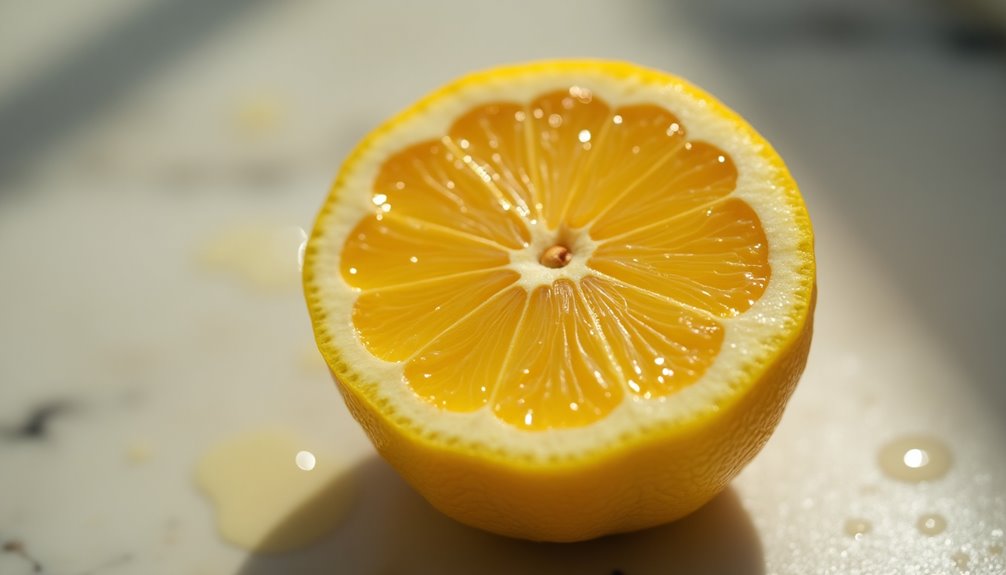
When you’re cooking or baking, knowing how much lemon juice you can expect from one lemon can save you time and hassle. A medium lemon typically yields about 2 to 3 tablespoons of juice, but you might be surprised to learn that some larger lemons can produce up to a quarter cup, or 4 tablespoons. On average, you can count on getting approximately 3 tablespoons of juice from one medium lemon. This makes it a handy measurement to remember, especially when a recipe calls for a specific amount. Additionally, it’s essential to consider that the juiciness of a lemon can vary depending on its ripeness and freshness. If you ever find yourself wondering how much juice is in a lemon, it’s a good practice to have an extra lemon or two on hand, especially for recipes that require precise measurements. Keeping this knowledge in mind can enhance your culinary experience and ensure your dishes turn out just right.
However, it's important to note that the actual juice yield can vary significantly. The size, ripeness, and variety of the lemon all play a role in how much juice you can extract. You might encounter smaller lemons that yield as little as 1½ tablespoons. So, if you're following a recipe that requires a precise amount of lemon juice, it's good to have a few extra lemons on hand just in case.
If you need about 1 cup of lemon juice, you’ll typically need around 5 to 6 medium lemons. This highlights the variability in juice extraction; not all lemons are created equal! While you might get lucky and find a lemon that’s bursting with juice, another might leave you squeezing for more. Knowing how much juice you can generally expect helps you plan better and avoid frustration. To ensure you get the most out of your lemons, consider rolling them on the countertop with your palm before cutting. This helps to break down some of the internal membranes, making it easier to extract more juice. It’s helpful to know that on average, you can expect about 2 to 3 tablespoons of juice from one lemon; therefore, understanding how much juice in one lemon can guide you when preparing recipes that call for a specific amount of lemon juice.
To maximize the amount of juice you get from a lemon, consider using some simple techniques. For instance, rolling the lemon on the countertop before cutting it can help break down the membranes inside, making it easier to extract more juice. You might also try microwaving the lemon for about 10 seconds; this can warm it slightly and loosen the juice, allowing for a better yield.
When you're juicing, don't forget to strain the juice if you want to avoid pulp in your recipes. This can make a noticeable difference, especially in dressings or cocktails where a smooth texture is preferred. If you're preparing something that requires lemon zest, remember to zest the lemon before you cut it; this way, you won't lose any of that flavorful zest while trying to extract the juice.
Frequently Asked Questions
How Much Juice Do You Get From One Lemon?
When you squeeze a lemon, you can expect to get about 2 to 3 tablespoons of juice, depending on its size and ripeness.
For an average medium lemon, you'll likely get around 3 tablespoons. If you're working with larger lemons, you might even extract up to 1/4 cup.
Can You Substitute Bottled Lemon Juice for Fresh Lemon Juice?
Yes, you can substitute bottled lemon juice for fresh lemon juice, but you should be cautious.
Bottled lemon juice is more concentrated and may affect your dish's flavor. Start with a smaller amount and adjust to taste, since its acidity can vary by brand.
Keep in mind that fresh lemon juice offers a vibrant flavor that bottled juice lacks, so if possible, go for fresh to enhance your recipe's overall taste.
How Much Real Lemon Equals the Juice of One Lemon?
When you're looking to substitute real lemon juice, remember that about 2 to 3 tablespoons of bottled lemon juice equals the juice from one medium lemon.
If you're using a larger lemon, you might get up to 4 tablespoons.
To get the best flavor, always choose a high-quality bottled option.
If you've got fresh lemons, squeezing them right before use will give your dish that vibrant, fresh taste you're after!
Is 100% Lemon Juice in a Bottle the Same as a Lemon?
No, 100% lemon juice in a bottle isn't the same as a fresh lemon.
While it offers convenience, it often lacks the vibrant flavor and nutritional benefits of freshly squeezed juice.
Bottled juice can contain preservatives that alter its taste and acidity, making it less potent.
If you want the best flavor and health benefits, you should reach for a whole lemon instead of relying solely on bottled juice.
Conclusion
So, the next time you reach for a lemon, remember that each one holds about 2 to 3 tablespoons of juice—much like life, where small things can pack a punch. Just as a single lemon can brighten up a dish, your unique contributions can enhance the world around you. Embrace those moments of zest; they're what make life flavorful. After all, it's the little squeezes of joy that create the most memorable experiences.
Cindy thoroughly researches juicing trends, techniques, and recipes to provide readers with practical advice and inspiration. Her writing style is accessible, engaging, and designed to make complex concepts easy to understand. Cindy’s dedication to promoting the advantages of juicing shines through her work, empowering readers to make positive changes in their lives through the simple act of juicing.

